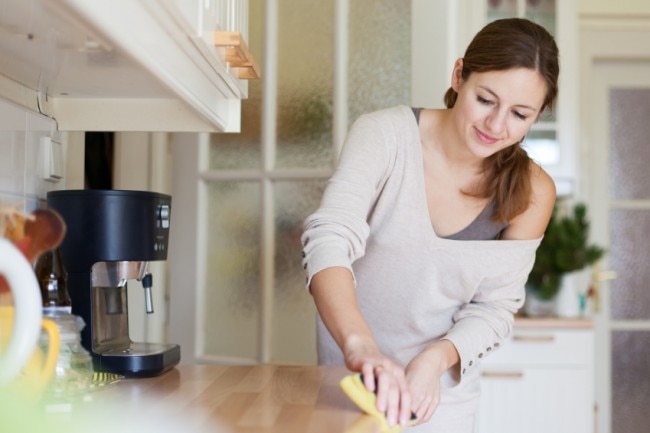Reading the ingredients on a common household cleaner can be kind of terrifying. Butyl cellosolve? You’ll find it in most all-purpose cleaners and it’s been shown to damage the nervous system, the kidneys and the liver. Formaldehyde? It’s a prime ingredient in many of the spray deodorizers that we use in our home and, in addition to causing respiratory problems, it’s a suspected carcinogen. We spray it into our air to make our home smell better, but it ultimately makes it harder for us to breathe. It makes little sense to me.
The Organic Consumers Association reports that, “Cleaning ingredients vary in the type of health hazard they pose. Some cause acute, or immediate, hazards such as skin or respiratory irritation, watery eyes, or chemical burns, while others are associated with chronic, or long-term, effects such as cancer.” In addition to health concerns, household cleaners create a tremendous amount of packaging waste. Considering all of the potential downsides to these products, it may be time to consider some green alternatives to help keep your kitchen clean and safe.
How Clean are you Really Getting Your Dishes?
Using a built-in dishwasher uses less water than hand-washing and gets your dishes cleaner because of the high water temperature. Sometimes you still need to hand-wash, though, so look for a natural soap like Mrs. Meyer’s Clean Day Liquid Dish Soap--the rosemary scent is my favorite! There is a lot of debate about whether sponges or microfiber towels are better at preventing the spread of germs while keeping your ecological impact minimal. We like the Twist Naked Sponge. It’s free of chemical and colors, and can be sanitized in the microwave or dishwasher.
Avoid Cross-Contamination on Countertops
You prepare and serve food on your counters. Make sure that you’re cleaning effectively so that the chicken you made for dinner last night isn’t infecting the pancakes you’re preparing in the morning with salmonella. Traditional cleaners may do a good job at killing these kinds of bacteria, but they also leave behind chemical residue that's dangerous to your health. Check out Zum Clean Granite & Countertop Cleaner. It has no bleach or ammonia. It’s delicate scent comes from pure essential oils that are naturally anti-bacterial. The bottle is also 100% recyclable.
Treat Floors as Gently and Carefully as You Would Dishes
Young children and pets spend a lot of time on the floor and are prone to tasting all sorts of items. Your floor cleaner could potentially expose them to dangerous untested chemicals. Babyganics Floors to Adore can be used on all types of surfaces--tile, vinyl, hardwood, porcelain, laminate, and even in carpet cleaners. It helps you to create safe play spaces using only plant-based cleaning power and without leaving any residue behind.
Ditch Wooden Cutting Boards
Wooden cutting boards can be a beautiful addition to your kitchen, but once they get nicks in them, they create a space for bacteria to fester. A glass cutting board is a much better long-term option, as it is nonporous and more germ resistant.
Pay Attention to Your Faucet
Your kitchen faucet regularly comes into contact with dirty dishcloths and sponges, as well as food particles that splash on it. Get rid of germs and keep the water coming out of your faucet clean with simple vinegar. Simply remove the filter once a week and soak it in white vinegar overnight to keep bacteria at bay.
Finally, Incorporate Plant Life to Keep Air Clean
Introducing many common houseplants into your kitchen can help improve the air quality in your home. Reduce the amount of formaldehyde, benzene, ammonia and other chemicals that may be contributing to pollution in your home with plants like peace lilies, gerbera daisies, lady palm, philodendrons and aloe vera. An aloe plant is also great to have in your kitchen as a handy and natural remedy for burns.




